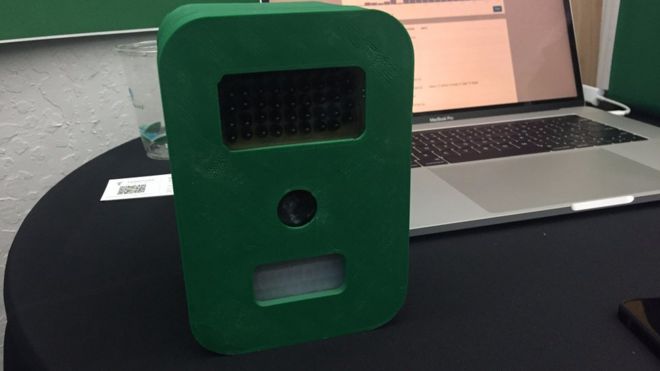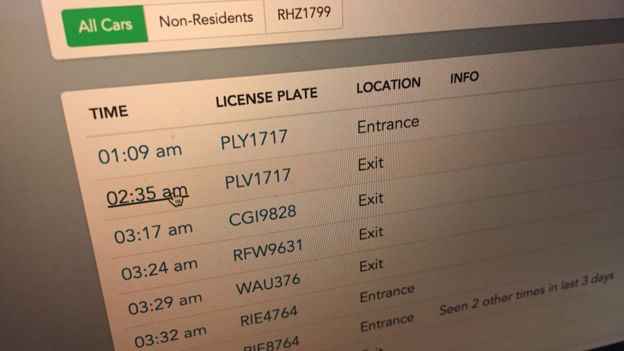
A start-up that gives occupants a chance to screen who drives all through their neighborhood was among the organizations uncovered at a Silicon Valley occasion on Monday.
Run's sensor, which it offers for $50 a year for every house, logs the number plates of each auto that crashes into a road and takes a photo. The sensor could inevitably give facial acknowledgment.
Inhabitants of checked neighborhoods can quit being followed - however guests, or individuals going through, can't.
Run is sponsored by Y Combinator, a start-up "hatchery" which in the past has supported triumphs including Dropbox, Reddit and AirBnB.
A protection master said he trusted the information gathering to be legitimate as indicated by US law, however that the thought could light a level headed discussion about the "right to be allowed to sit unbothered in broad daylight".
"One of the immense shortcomings in US security law is that we just ensure against interruptions into private ranges, not open spaces," said Albert Gidari, executive of protection at Stanford Graduate school's Inside for Web and Society.
"Open streets through neighborhoods, tags, walkers on open walkways and so forth all are reasonable diversion," he said.
The information is just influenced accessible to "neighborhood pioneers", To run says, and is a device that could be utilized to battle wrongdoing.
To date, one individual has been indicted thanks confirm caught by the gadget.
"An awful individual crashed into one of our [monitored] neighborhoods," clarified Garret Langley, CEO and fellow benefactor of Rush.

"He put a pleasant street bicycle in the back of his auto, and drove off with both the window down and the storage compartment open.
"Not exclusively do we have film of his tag, we have a photo of his face and a photo of the bicycle in the back."
'Not our information'
The innovation was flaunted at Y Combinator's Demo Day, the twice-yearly occasion at which business people pitch their organizations to a few hundred financial specialists.
Run's gadgets are being trialed in seven neighborhoods in and around Atlanta, with more areas over the US right now being considered.
Additionally at Y Combinator's Demo Day on Monday
Relationship Legend is an administration that means in to offer exhortation on your connections - individual or expert. The organization gives you a chance to examine issues via telephone or by means of a talk bot, and will even make recommendations over how to compose your messages. "This isn't treatment," the group said.
Plume is an organization offering fast turnaround furniture rental "for millennials and organizations". The firm will convey - in San Francisco and New York - expensive things that the organization trusts individuals never again need to purchase.
Focusing on disappointed Uber and Lyft drivers, Mystro makes is simpler to switch between different ride-sharing applications to show signs of improvement, more profitable admissions. It was made by Herb Coakley, a previous Uber driver. "I most likely drove some of you around," he told speculators.
70 Million Employments was made by Richard Bronson, a man imprisoned for securities extortion fixing to his work at Stratton Oakmont, the firm deified in the film The Wolf of Money Road. Presently his start-up tries to make it simpler for individuals with a criminal record to look for some kind of employment by utilizing calculations to coordinate abilities with firms hoping to enroll rapidly.
Darmiyan is an organization that says it utilizes machine figuring out how to identify indications of Alzheimers over 15 years before side effects develop. It hopes to have endorsement from the US Government Medication Organization inside the following year.
A moment day of introductions happens on Tuesday
Inhabitants in neighborhoods being trialed by Rush can quit being followed, however guests to those areas - or essentially individuals going through - have no chance to get of preventing the innovation from logging their developments.
"Ought to there be? I would surrender that over to the area to choose," Mr Langley told the BBC.
"We trust that our employment is to furnish the areas with the innovation to secure themselves as they see fit.
"We don't need into get into the matter of settling on choices about security and how this innovation is utilized past the first utilize case.
"It's not our information - it's the area's information - and we erase it following 30 days."
Stanford's Mr Gidari said the innovation maybe featured one example where long-existing laws might not have thought about the sorts of innovation on offer today.
"As these frameworks turn out to be more accessible and new stages for catching symbolism wind up noticeably less expensive to send, we may yet return to the issue of whether there is a privilege to be allowed to sit unbothered out in the open, to be dark or mysterious, or to be free from gathering and capacity in other's frameworks."
He included: "A couple of states have laws that preclude the gathering of biometric data - facial acknowledgment would raise the issue."




No comments:
Post a Comment